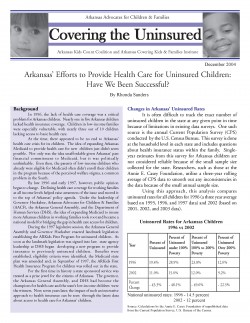
In 1996, the lack of health care coverage was a critical problem for Arkansas children. Nearly one in five Arkansas children lacked health insurance coverage. Children in low-income families were especially vulnerable, with nearly three out of 10 children lacking access to basic health care.
At the time, there appeared to be no end to Arkansas’ health care crisis for its children. The idea of expanding Arkansas Medicaid to provide health care for new children just didn’t seem possible. Not only was the idea unaffordable given Arkansas’ past financial commitment to Medicaid, but it was politically unthinkable. Even then, the parents of low-income children who already were eligible for Medicaid often didn’t enroll their children in the program because of the perceived welfare stigma, a common problem in the South.
By late 1996 and early 1997, however, public opinion began to change. Declining health care coverage for working families at all income levels helped raise awareness of the issue and moved it to the top of Arkansas’ policy agenda. Under the leadership of Governor Huckabee, Arkansas Advocates for Children & Families (AACF), the Arkansas General Assembly, and the Department of Human Services (DHS), the idea of expanding Medicaid to insure more Arkansas children in working families took root and became a national model for bridging the gap in health care access for children.
During the 1997 legislative session, the Arkansas General Assembly and Governor Huckabee enacted landmark legislation establishing the ARKids First Program for uninsured children. As soon as the landmark legislation was signed into law, state agency leadership at DHS began developing a new program to provide insurance to previously uninsured children. Benefits were established, eligibility criteria were identified, the Medicaid state plan was amended and, in September of 1997, the ARKids First Health Insurance Program for children was rolled out in the state.
For the first time in history a state sponsored service was treated as a prize jewel for the citizens of Arkansas. The governor, the Arkansas General Assembly, and DHS had become the champions for health care and the state’s low-income children were the winners. Now, seven years later, the impact of such an innovative approach to health insurance can be seen through the latest data about access to health care for Arkansas’ children.
